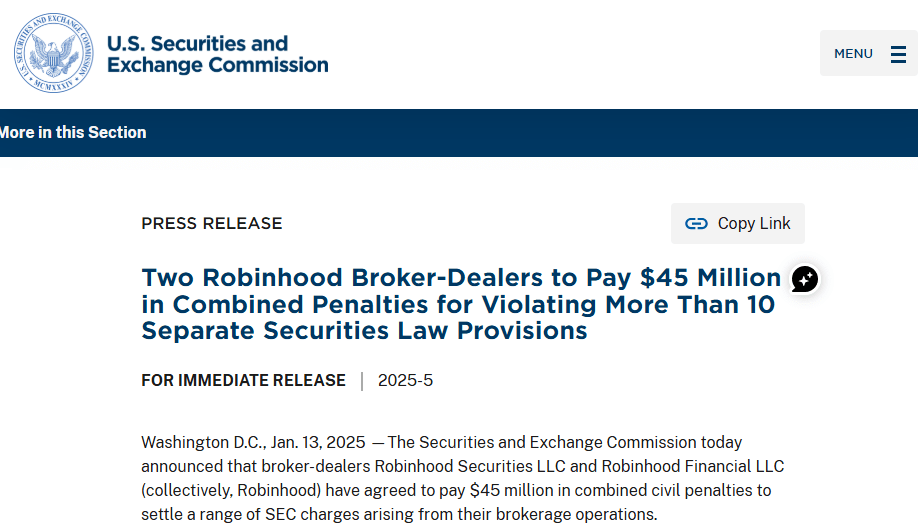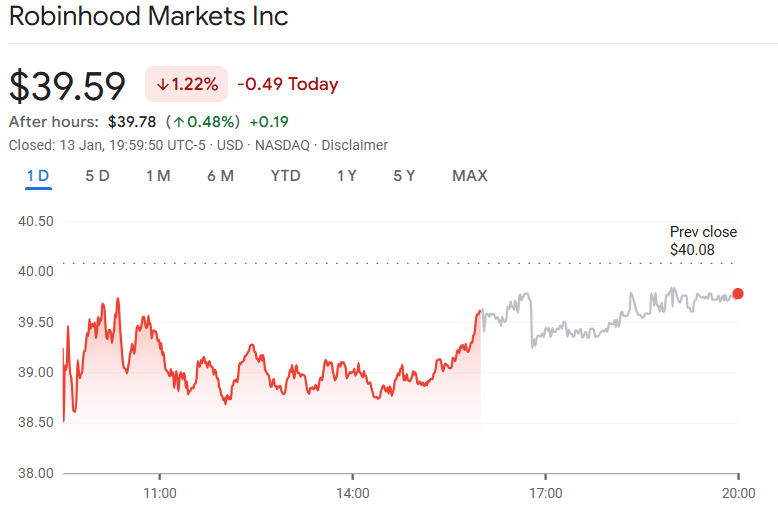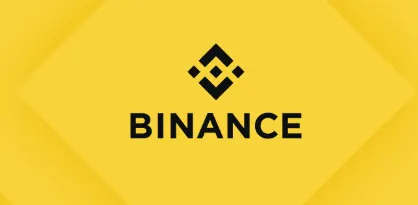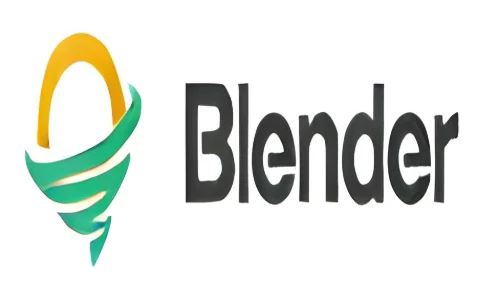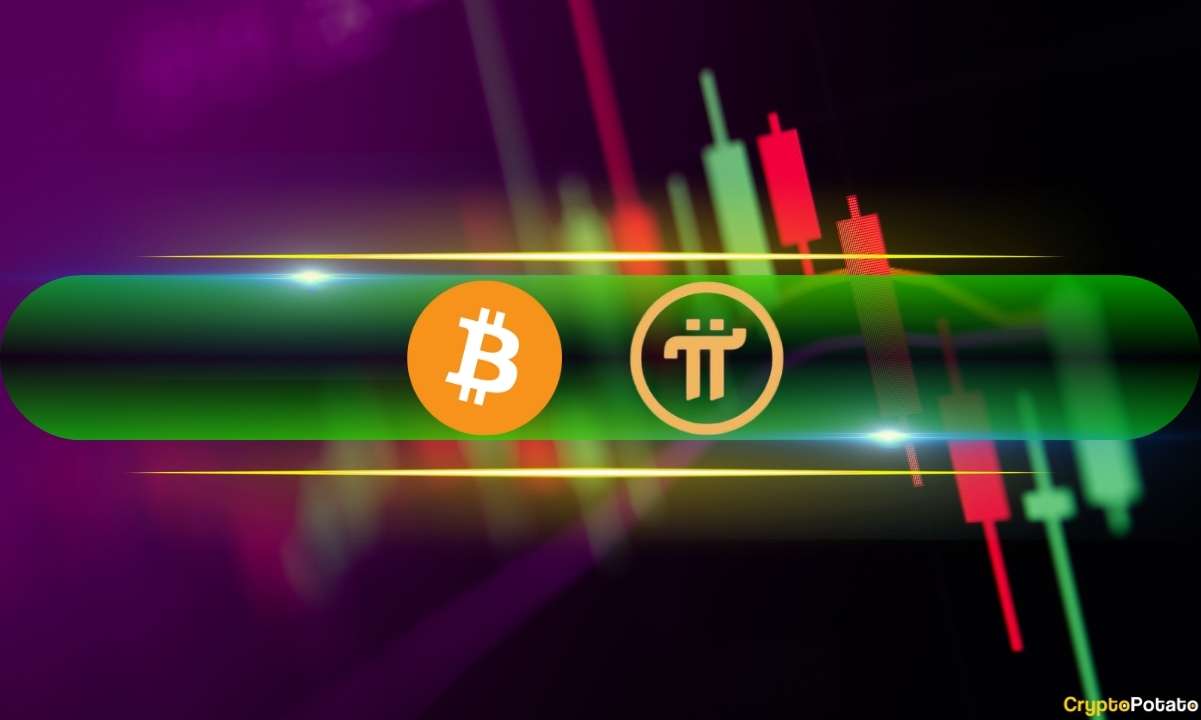 CaryptosHeadlines Media Has Launched Its Native Token CHT.
Airdrop Is Live For Everyone, Claim Instant 5000 CHT Tokens Worth Of $50 USDT.
Join the Airdrop at the official website,
CryptosHeadlinesToken.com
CaryptosHeadlines Media Has Launched Its Native Token CHT.
Airdrop Is Live For Everyone, Claim Instant 5000 CHT Tokens Worth Of $50 USDT.
Join the Airdrop at the official website,
CryptosHeadlinesToken.com
Some of the other accusations against Robinhood include misreporting trades, delayed suspicious activity reports, and inadequate customer safeguards. Meanwhile, the Supreme Court declined Binance’s appeal in a class-action lawsuit alleging unregistered securities sales. This is in addition to the exchange’s growing list of global legal troubles. Additionally, the US indicted three Russians for operating crypto mixers Blender.io and Sinbad.io, accusing them of laundering funds linked to cybercrimes.
Robinhood Reaches $45 Million Settlement with the SEC
Robinhood agreed to a $45 million settlement with the US Securities and Exchange Commission (SEC) after an investigation that uncovered violations of more than ten securities law provisions. The penalty affects Robinhood Securities LLC and Robinhood Financial LLC, both of which failed to meet a wide range of regulatory requirements.
These included inaccuracies in reporting trading activity, non-compliance with short sale rules, delayed filing of suspicious activity reports, failure to maintain and preserve customer communications, and inadequate safeguarding of customer information.
(Source: SEC)
The SEC’s order was released on Jan. 13, and revealed that Robinhood entities admitted to certain findings, including the failure to preserve electronic communications from customers between 2020 and 2021. The company also submitted more than 11,849 Electronic Blue Sheets with errors or omissions, which caused it to misreport data for at least 392 million transactions. Additionally, Robinhood did not report suspicious activity quickly enough between January of 2020 and March of 2022 and failed to implement sufficient identity theft protection measures from April 2019 to July 2022.
The regulator also pointed out Robinhood’s non-compliance with Regulation SHO, which addresses abusive short-selling practices, from December 2019 to May 2022. In 2021, a cybersecurity vulnerability also allowed unauthorized access to customer information involving millions of accounts. Both Robinhood Securities and Robinhood Financial admitted to specific findings in the SEC’s order and agreed to be censured. Robinhood Securities will pay $33.5 million, while Robinhood Financial will pay $11.5 million, with the total $45 million penalty due by Jan. 27.
Robinhood’s stock (HOOD) was not impacted much by the settlement as shares only fell by about 1.22% to $39.59 on Jan. 13. Share prices also recovered slightly in after-hours trading.
Robinhood Markets stock price (Source: Google Finance)
It is still unclear if Robinhood’s cryptocurrency business played a role in these violations. However, the company’s crypto division settled with California regulators last September for $3.9 million over allegations of restricting customer withdrawals between 2018 and 2022. In this case, Robinhood did not admit or deny wrongdoing.
Despite its regulatory challenges, Robinhood’s crypto operations have seen a lot of growth. In the third quarter, its crypto trading volume increased by 112% year-on-year to $14.4 billion, while revenue from crypto trading surged by 165% to $61 million.
Supreme Court Rejects Binance Appeal
Other crypto companies are also currently budding heads with the law. The US Supreme Court recently declined to hear an appeal from Binance and its founder, Changpeng “CZ” Zhao, in a class-action lawsuit that was filed by investors alleging the exchange sold unregistered tokens that subsequently lost value. On Jan. 13, the Supreme Court denied a petition to review a lower court ruling that determined US securities laws applied to Binance, even though the exchange lacks a physical headquarters in the United States.
(Source: Supreme Court)
The lawsuit was initially filed in April of 2020 by Chase Williams on behalf of investors, and it claims Binance operated as an unregistered securities exchange or broker-dealer. A lower court ruled in March of 2023 that the case could proceed due to the fact that token purchases were finalized in the US and transactions occurred on US servers. Binance argued that the interconnected nature of global markets allowed Americans to trade on foreign exchanges without necessitating the application of US securities laws but failed to convince the courts.
The decision by the Supreme Court allows the case to move forward, which only adds to Binance’s mounting legal troubles in the United States. Since mid-2023, the SEC accused Binance and Zhao of selling unregistered securities and illegally providing services to US citizens. Additionally, in November of 2023, Binance agreed to a $4.3 billion settlement with the Department of Justice over violations of money laundering and terrorism financing laws.
Its legal challenges are not limited to the United States. Binance faces a class-action lawsuit in Canada for alleged securities law violations after its exit from the country in May 2023. In another case, the FTX bankruptcy estate is suing Binance and Zhao for $1.8 billion over claims of a fraudulent share deal in 2021. In August of 2024, Zhao and Binance were also sued over allegations of laundering stolen cryptocurrency.
Zhao’s personal legal battles intensified in April 2024 when he pleaded guilty to enabling money laundering at Binance and failing to enforce proper Anti-Money Laundering controls. He was sentenced to four months in prison and was released in late September.
US Indicts Russians Behind Crypto Mixers Blender and Sinbad
The US Justice Department indicted three Russian nationals, Roman Vitalyevich Ostapenko, Alexander Evgenievich Oleynik, and Anton Vyachlavovich Tarasov, for money laundering related to their operation of crypto mixers Blender.io and Sinbad.io. A federal grand jury in the Northern District of Georgia charged the trio, and alleged their mixing services facilitated laundering funds that were stolen through ransomware, cryptocurrency thefts, and other crimes, according to US Attorney Ryan Buchanan. Principal Deputy Assistant Attorney General Brent Wible stated that the mixers made it possible for state-sponsored hackers and cybercriminals to profit from offenses that threatened public safety and national security.
Blender.io was sanctioned by the US Department of the Treasury’s Office of Foreign Assets Control (OFAC) in May of 2022 for its alleged role in laundering illicit proceeds from a crypto heist tied to North Korea’s Lazarus Group. Elliptic, a crypto analytics firm, reported that Blender likely rebranded as Sinbad.io in February 2023, which led the OFAC to sanction Sinbad in November of 2023. Authorities dismantled Sinbad.io later that year, but the investigation continued by focusing on identifying and prosecuting those responsible.
Ostapenko and Oleynik were arrested in December 2024, while Tarasov is still at large. If convicted, the three face charges of conspiracy to commit money laundering and operating an unlicensed money-transmitting business. Their sentences could exceed 25 years.
The enforcement actions against crypto mixers are part of broader efforts to address illicit financial activity in the crypto space. In addition to targeting Blender and Sinbad, US and international authorities have started cases against Tornado Cash.
However, sanctions against Tornado Cash in August 2022 drew a lot of criticism from the crypto industry. Advocacy groups like Coin Center and Coinbase-backed individuals even challenged the sanctions in court. Legal proceedings are still ongoing for Tornado Cash co-founders, including Roman Storm. His US money laundering trial is set for April. Alexey Pertsev was sentenced to over five years in prison in the Netherlands in 2024.









